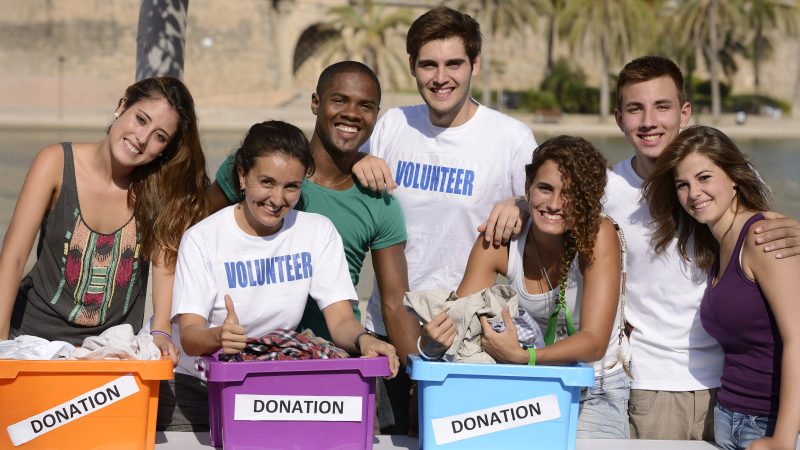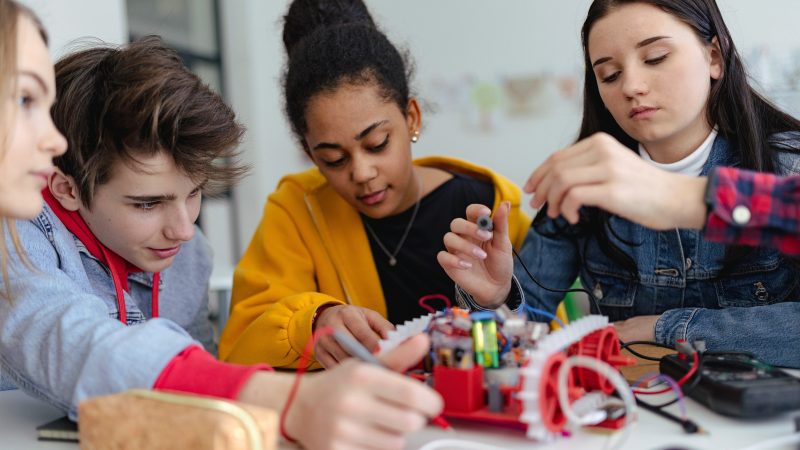
While the summer period is a great time for high school students to relax and recharge, it is also a fantastic opportunity for enrichment—especially when it comes to strengthening college applications. Students can use the break to pursue hobbies and interests they don’t have time for during the school year or participate in academic and community opportunities that align with their long-term goals.
There is no shortage of summer activities available to Houston high school students, and your student can start researching the possibilities – both in the immediate community and on a nationwide scale – well before the end of the academic year. Of course, narrowing down these opportunities can be overwhelming! To make sure your student makes the most of their time off, they should:
- Consider how their extracurriculars align with their interests and passions. A strong history of engagement in a particular field can showcase genuine interest and help them stand out on college applications.
- Pursue leadership opportunities wherever they can. Leadership roles, whether as a camp counselor, team captain, or organizer, demonstrate potential and commitment.
- Use their time purposefully and avoid overcommitting. Balancing learning opportunities with downtime is key to managing stress and preventing burnout.
Types of Summer Opportunities for Houston High School Students
With these best practices in mind, we’ve broken down the major categories of summer opportunities for your high schooler to consider, along with curated examples of excellent opportunities in Houston and beyond.
Academic Summer Camps
Academic camps allow students to dive deep into subjects they love, surrounded by peers who share their enthusiasm. These experiences not only boost academic skills but also provide a glimpse into college life—from staying in dorms to navigating campus. Participating demonstrates a student’s intellectual curiosity and commitment, qualities that colleges look for.
- Rice University Summer Scholars Program — Rice University [multiple blocks available to students, ranging from May 12 to August 15, 2025] | A residential camp offering college‑level courses and research opportunities in humanities and STEM for rising juniors and seniors.
- The Idea Factory at University of Houston — University of Houston [two back-to-back session options, June 9–20, 2025] | A one-week summer program at the University of Houston for high school students wanting to explore how products are designed and made.
- Rice ELITE Tech Camp | Rice University [various week-long options between June 22 – July 25, 2025] | A pre-college engineering summer program for high school students that aims to prepare young people to be tomorrow’s leaders in technology and engineering.
- MD Anderson Cancer Center CATALYST Summer Programs — University of Texas MD Anderson Cancer Center [various between June 2 – August 8, 2025] | A collection of programs for recent high school graduates to engage in immersive, mentor-led research experiences in biomedical sciences, cancer medicine, and clinical care, with specialized opportunities for underserved communities, hands-on projects, and professional development to inspire future STEM and healthcare careers.
- Lavner Education Tech Revolution STEM Summer Camps — Rice University [various between June 2 – August 8, 2025] | A series of week-long camps designed to give students valuable experience in the fields of Robotics, Coding, Game Design, Minecraft, Roblox, Artificial Intelligence, 3D Printing, Content Creation for YouTube, Filmmaking, Digital Art, Spy Tech, STEM & Medicine, and more.

Summer Internships
Internships are the perfect way for high school students to gain real-world experience in fields they’re passionate about. By working directly alongside professionals, students can explore potential career paths, strengthen their college applications with meaningful experience, and build connections that may lead to valuable recommendations.
- NASA OSTEM High School Internship Programs — NASA Johnson Space Center [Usually mid‑June to mid‑August] | NASA offers various programs for rising seniors to gain hands‑on experience in aerospace research, engineering, and technology. To get started, they encourage students to join this webinar on May 8th.
- Houston Methodist High School Emerging Researcher Experience — Houston Methodist Hospital [June 9 – August 1, 2025] | An eight-week, full-time program for students interested in biomedical and health sciences, offering exposure to laboratory research and clinical shadowing.
- University of Houston High School Summer Research Internships | MohanLab, University of Houston [June 2 – July 25, 2025] | Offers rising high school seniors hands-on lab training, mentored research, and potential publication opportunities with UH faculty in state‑of‑the‑art laboratories.

Houston Volunteering Opportunities
Volunteering shows colleges that a student is engaged with their community and committed to making a positive impact. Whether assisting at food banks, supporting conservation efforts, or working on community outreach, these experiences highlight compassion, leadership, and teamwork—attributes highly valued by admissions officers.
- Houston Food Bank Summer Youth Volunteer Initiative — Houston Food Bank locations across Houston [year-round volunteer opportunities] | Enables students aged 16+ to assist in sorting, packing, and distributing food while building leadership and teamwork skills.
- Habitat for Humanity Houston Youth Build — Various project sites throughout Houston [various opportunities] | Provides hands‑on construction experience by helping build or renovate homes for local families.
- City of Houston Parks and Recreation — Multiple locations throughout Houston [various; contact representative to schedule] | A city-sponsored initiative engaging students in civic projects such as park clean-ups and neighborhood beautification.
- First Year Zoo Crew Explorers Program — Houston Zoo [four week-long sessions between June 2 – August 8, 2025]| For students passionate about wildlife and conservation, supporting educational programs and animal welfare.
- HPL Teen Advisory Club (TAC) Volunteer Program — Various Houston Public Library branches [multiple sessions during Summer 2025] | A recurring group to collaborate on library initiatives, plan programs, volunteer for projects, and act as ambassadors—gathering to brainstorm ideas, organize events, and promote library services to peers in Houston.

Pre‑College Programs
Pre-College Programs differ from traditional academic camps by typically accommodating students across grades K-12 and offering a broader range of educational experiences. These programs enhance a student’s summer through engaging in-person or online curricula and provide opportunities for high schoolers to build peer connections and familiarize themselves with college environments. However, participation in pre-college programs should not be considered an advantage in the admissions process; most institutions explicitly state that attending their programs does not influence admission outcomes.
- Northwestern University’s Center for Talent Development provides extensive options, including honors and Advanced Placement (AP) courses, leadership initiatives, service-learning activities, and residential camps located on Northwestern’s Evanston, Illinois, campus. Programs are available for students ranging from Pre-K through 12th grade.
- Emory University’s Pre-College Program specifically targets high school students, allowing them to choose from over one hundred introductory-level courses, including basic language instruction and foundational sciences. Students may enroll in multiple courses, with sessions beginning in three separate waves—mid-June, late June, and mid-July. Programs are open to rising 10th and 11th graders, and application deadlines occur two weeks before each session’s start date.

Summer Jobs
Taking on a summer job demonstrates responsibility, maturity, and initiative—all traits that colleges appreciate. Working during the summer equips students with practical skills, exposes them to diverse professional environments, and gives them the chance to highlight leadership and reliability on their applications.
- HISD Summer Student Employment Program — Various HISD schools across Houston | Many campuses provide summer employment in school departments, offering practical work experience in administrative, library, and maintenance roles.
- City of Houston Summer Jobs Program — Various city-operated sites across Houston, Summer 2025 (multiple shifts) | A city-sponsored initiative offering paid positions in public service sectors like parks, community centers, and government offices.
- Houston Arboretum & Nature Center Nature Camp — Houston Arboretum & Nature Center [week-long programs between June 2 – August 8, 2025] | Offers positions for students interested in environmental conservation, assisting with public education and grounds maintenance.
- Texas Aquatic Enterprises Lifeguard — Houston Pools [all summer long] | Save lives while taking advantage of paid training/certification, flexible shifts, and seasonal opportunities across Houston—ideal for first-time job seekers, teens, and those seeking hands-on experience in aquatics.

Passion Projects
Passion projects empower students to explore personal interests through self-driven, creative initiatives. By undertaking an independent project—such as developing an app, launching a startup, or producing artistic work—students showcase their proactivity, dedication, and genuine enthusiasm for learning beyond traditional academics. These projects not only enrich students’ personal growth but also significantly enhance their college applications by demonstrating initiative, creativity, and leadership. Here are several ideas for engaging passion projects:
- Start a Podcast or YouTube Channel: Create content around personal interests or educational topics, gaining valuable skills in scripting, filming, audio editing, and digital marketing.
- Organize an Awareness Campaign: Champion an important cause through targeted research, community outreach, creation of educational materials, and collaboration with local organizations or government representatives.
- Develop a Mobile or Web App: Learn coding, UI/UX design, market research, and project management by creating a digital application designed to solve a real-world problem or offer entertainment.
- Publish Original Writing: Write and self-publish a short story, poetry collection, or even a novel. Students develop literary skills, persistence, and insight into the publishing process.
- Launch a Small Business: Sell handcrafted items, provide tutoring services, or offer technical support to develop entrepreneurship, financial management, and marketing skills.
- Conduct a Research Project: Investigate a scientific hypothesis, historical event, or social issue, culminating in a research paper, documentary, or presentation. Connect with mentors or experts for guidance.
- Create a Community Art Installation: Plan and execute a mural, sculpture, or interactive exhibit that engages local community members and demonstrates artistic talent and organizational skills.

Online Learning Opportunities
Online courses offer flexible, engaging ways for students to pursue their intellectual interests from anywhere. Completing online coursework during the summer demonstrates self-motivation, time-management skills, and a commitment to learning—all qualities that can make a student’s application stand out to admissions committees.
- iD Tech Online Summer Camps | Interactive courses in coding, game design, robotics, and more with live, small-group classes.
- Stanford Pre‑Collegiate Online Summer Institutes | Immersive academic courses spanning STEM, humanities, and the arts guided by Stanford faculty.
- Outschool Virtual Summer Learning Courses | A diverse catalog of live, interactive courses ranging from creative writing to advanced science.
- Open Yale Courses | Full courses taught at Yale between 2006 and 2011, including video lectures, syllabi, suggested readings, and exams. In addition to STEM, Open Yale Courses include classes in the humanities, such as history, philosophy, and religious studies
- edX High School Online Summer Learning Series | Curated online courses from top universities covering STEM, literature, entrepreneurship, and more.
Not Sure Where to Start? We Can Help!
General Academic’s Early Guidance and Counseling Program (EGCP) provides structured support designed to get 9th, 10th, and 11th graders prepared to apply to college in the fall of their senior year. Our tutors also offer academic support and top-notch test prep. Let us help your student:
- Understand and express their interests, passions, and goals
- Identify and apply to summer opportunities that are a great fit
- Prepare for the SAT and ACT or get ahead in a particular subject
Contact us to get started today.






